Janice Hardy's Blog, page 5
September 28, 2024
How Do You Know if Your Writing is Getting Better?
 By Janice Hardy, @Janice_Hardy
By Janice Hardy, @Janice_Hardy Without objective feedback, it's hard to know if you're improving or just making the same mistakes.
Almost every writer at some point has wondered, "Is my writing getting any better?" I've wondered about it, many writers I know have wondered about it, and odds are good you have, too. It's a normal question when what you're doing is so subjective.
Sadly, there's no easy checklist to verify if you're improving or not. It's also really tough to judge our writing, because it's hard to be subjective about our own work. We can love our bad writing and hate our good writing—and we often have trouble telling the difference.
Of course, you can always get a paid critique or manuscript review from a trusted professional source, but not everyone has or can afford that option. For this post, I'm focusing on what we can do on our own. Continue ReadingWritten by Janice Hardy. Fiction-University.com
September 21, 2024
Stepping Out: A Look at Point of View Shifts
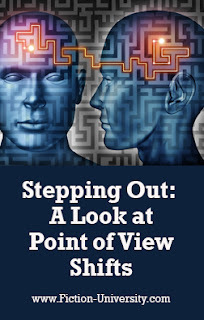 By Janice Hardy, @Janice_Hardy
By Janice Hardy, @Janice_Hardy Slipping out of your point-of-view-character's head can jar a reader right out of the story.
Years ago, I started a book and set it down before I'd finished the first chapter. The precise moment, was when a paragraph began in one character's head, and ended in another character's head. Even worse, those two characters were in different countries, so it wasn't as if it was an omniscient narrator with characters in the same scene.
That point of view shift killed the book for me, and I've never tried anything by that author since.
If you're unfamiliar with the term, a point of view shift is when the author shifts out of the point-of-view-character's head, either into another character, or showing/explaining something that character couldn’t possibly know.Continue ReadingWritten by Janice Hardy. Fiction-University.com
September 14, 2024
4 Must-Ask Questions Before You Start Your Novel
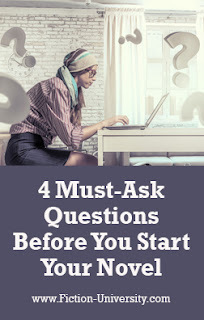 By Janice Hardy, @Janice_Hardy
By Janice Hardy, @Janice_HardyA little thinkingbefore you start writing can make a huge difference in how easy that story isto write.
For some writers, a blank page is a scary thing to face. Forothers, they see all that white space as an opportunity, and can't wait to divein and tell their story. The vast majority of us probably fall somewhere inbetween, with some ideas making us eager to write, and some fighting us forevery word.
I've discovered through (often painful) trial and error,that my novels go smoother when I spend some time planning them before I writethem. I don't have to figure everything out,but knowing what my core conflict is, what my protagonist needs to do, and whomy antagonist is makes it a lot easier to write the first draft. I struggleless, my plot comes together more quickly, and the manuscript turns out muchcleaner.
Continue ReadingWritten by Janice Hardy. Fiction-University.comSeptember 7, 2024
You Can Fight Mama Nature: What to do When Your Antagonist is Nature Herself
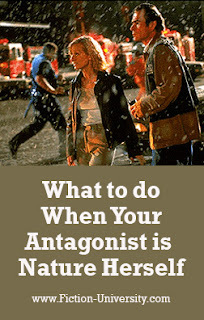 By Janice Hardy, @Janice_Hardy
By Janice Hardy, @Janice_Hardy Some antagonists can't be fought—they can only be survived.
It's common to hear "antagonist" and think "villain," but the two are not synonymous. An antagonist is just who or what is preventing your protagonist from achieving their goal. Often, that is a person and a bad one at that, but it can also be from a conflict type that has no personal stake in the game.
Like Mother Nature.
Your antagonist can come from any of the four basic conflict types, and they each focus on a different type of conflict opposition. We've discussed the person vs. society conflicts, and person vs. self antagonists, so let's look at the person vs. nature conflicts.
Person vs. Nature conflicts have often undefeatable foes to deal with, because they focus on taming the untamable or surviving the overwhelming threat.
A great example of a nature antagonist is a traditional disaster movie like Volcano. Continue ReadingWritten by Janice Hardy. Fiction-University.com
August 24, 2024
An Easy Tip for Tightening Your Novel’s Plot
 By Janice Hardy, @Janice_Hardy
By Janice Hardy, @Janice_Hardy A loose plot can easily unravel, but tying up the threads strengthens the entire novel.
One of my favorite things when writing is when I make an accidental connection that fits so well it looks like I’d planned it all along. It’s my subconscious working in the background.
One day, it dawned on me that I didn’t have to wait for my inner writer to clue me in—I could consciously look for those connections.
Once I started looking, I found multiple “hidden connections” per book that deepened the plot and made it more unpredictable. The obvious characters became red herrings for the more subtle characters lurking in the background doing “plot things” and making the story work.
Plus, it’s a ton of fun.
Continue ReadingWritten by Janice Hardy. Fiction-University.com
August 10, 2024
Why You Should Write a Novel "Just for Fun"
 By Janice Hardy, @Janice_Hardy
By Janice Hardy, @Janice_Hardy Not everything you write needs to be published—or even publishable.
A few years after I published my third novel ( Darkfall ), I fell into a dark time with my writing. I was drafting a novel that did not want to work the way I wanted it to, and I dreaded sitting down at the keyboard every day. Writing was no longer fun.
With sad relief, I set the manuscript aside and worked on a non-fiction project I'd been wanting to do (my very first writing book, Plotting Your Novel: Ideas and Structure ). I fully intended to return to fiction afterward, expecting my dread of the novel to have passed by then.
It hadn't.
I'll be honest—it was terrifying.
Continue ReadingWritten by Janice Hardy. Fiction-University.com
July 17, 2024
5 Common Problems With Endings
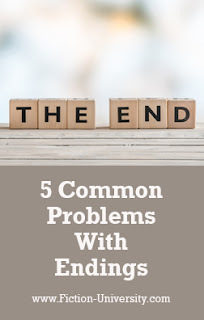 By Janice Hardy, @Janice_Hardy
By Janice Hardy, @Janice_Hardy Your ending is the whole point of your book.
This is the last post in my mini-series on common problems in beginnings, middles, and endings. Today, we’ll take a look at common problems with endings.
When a reader picks up your novel, they do so because something about the blurb made them think "This sounds like a great book." It might be the premise, the voice, the setting, or even a character, but something intrigued them enough to give it a try. How you end the novel and resolve the story will determine whether or not that reader raves about the novel the next day, or forgets about it before the week is over.
Oh yeah, endings have that kind of power.
Because the ending is the moment readers have been waiting for the entire book (no pressure). It resolves the core conflict of the novel and puts the protagonist up against the antagonist, which is why the most common problem with endings is that they don't live up to that promise.
The only thing tougher than an ending is the middle. Except for the beginning.
Continue ReadingWritten by Janice Hardy. Fiction-University.com
July 10, 2024
How Your Character’s Internal Conflict Can Help You Plot
 Janice Hardy, @Janice_Hardy
Janice Hardy, @Janice_Hardy If you've been struggling with a plot, or you're looking for ways to deepen an existing plot, try looking at how your protagonist's internal conflict is driving her external actions.
A lot of focus gets put on the core conflict of a novel—the main problem the protagonist has to solve to win—and for good reason. It's the whole point of the book. But sometimes, when we look too hard at the external problems, we miss out on opportunities to let the internal problems muck things up. This is especially true in a character-driven novel, since that inner journey is what's driving the entire book.
While you can’t plot with a character arc, you can use it to create your plot, because what a character has been through and fears, if what determines how they face their problems and make decisions.
At the heart of every good internal conflict is a fear created by trauma. Continue ReadingWritten by Janice Hardy. Fiction-University.com
June 26, 2024
Getting the Best Response From Your Characters
 By Janice Hardy, @Janice_Hardy
By Janice Hardy, @Janice_Hardy Don't confuse your readers by mixing up what happens when and why.
When one of my nieces was little, she'd tell me stories about her day. They usually made no sense, and not just because she was seven. She'd always tell me what she did before she told me why she did it.
"I cried on the swings, because it wasn't fair and they yelled at me."
It often took multiple follow-up questions to get the real story that she got scolded for playing in a sandbox she'd been told three times not to play in (the reason why involved a cat mistaking it for a litter box).
Granted, few writers write a novel like a seven year old telling a story, but mixing up the stimulus/response structure happens all the time. Usually it's a small mistake that readers can figure out and move on from, but sometimes it's a big error and leaves them confused.Continue ReadingWritten by Janice Hardy. Fiction-University.com
June 12, 2024
Writing Your Novel Backward Might Be the Secret to Success
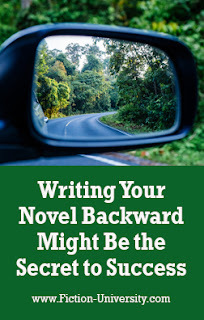 By Janice Hardy, @Janice_Hardy
By Janice Hardy, @Janice_Hardy It’s hard to plot a novel if you don’t know what problem it’s trying to solve.
Creating plots has always been easy for me, but endings are my nemesis. I usually have a general sense of what they are before I start a novel, but far too often, I have no clue about the specifics on how my conflict is resolved. My outline might say, Nya needs to “stop the bad guy using her shifting ability.” Grace needs to “find her father.” Chip needs to “solve the murder.”
Vague as they are, my endings at least give me a direction to work toward, which is sometimes all you need to start writing. I might not know how my protagonist solves their problem, but I know what generally needs to be done and where the plot is headed.
Not all writers are this lucky. Some—maybe even you—have no idea where their story is going, because they don’t know what “the end” looks like.
Continue ReadingWritten by Janice Hardy. Fiction-University.com



